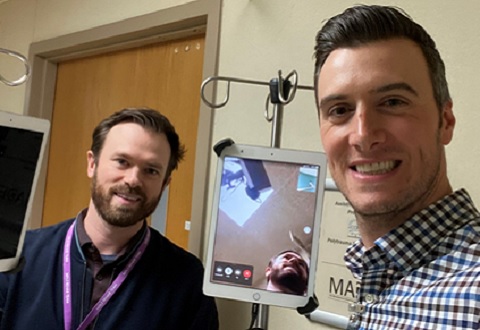Polytrauma/TBI System of Care
Safe and Secure Connections with COVID-19 Patients

Ben Barrett, Physical Medicine and Rehabilitation AT Program Coordinator and Beau Bedore, Spinal Cord Injury and Disorder Center AT Director, standing next to one of the patient room mounted iPads.
The Minneapolis VA Health Care System (MVAHCS) iPad Video Monitoring and Assessment (iVMA) Pilot Program is the result of an innovative collaboration between leaders in telehealth, biomed, clinical applications, nursing, and assistive technology aimed at reducing the use of personal protective equipment (PPE) among staff in COVID-19 units through the implementation of technology that enables video monitoring and assessment.
The iVMA Pilot Program was established in March 2020 through a joint effort by Angela Nichols, MVAHCS Telehealth Coordinator, Herb Stockley, Biomedical Equipment Support Specialist, Danielle Matthews, Clinical Applications Coordinator, Brandon Porter, Clinical Applications Coordinator, Ben Barrett, PM&R Assistive Technology Program Coordinator, and Beau Bedore, SCI/D Assistive Technology Director and has already been successfully implemented on three different units throughout the medical center.
“The success of this Pilot Program is due in large part to the unique configuration of iOS settings and the use of accessibility features that were enabled on the iPads to ensure that the interface between providers and patients seamless and efficient,” said SCI/D Assistive Technology Director, Beau Bedore. “The iPads were configured to allow an authorized Provider iPad to instantaneously connect to a Patient iPad in a given room by simply tapping on a shortcut on the Home Screen of the device; this action initiated a FaceTime call that was automatically answered within seconds on the Patient iPad without requiring any action on the patient end (the patient did not need to move nor touch the screen at all).”
Beyond its clinical benefits and preserving PPE the iVMA Pilot Program also allows for family, friends, and caregivers to connect with patients in isolation. This added tool for connection can boost the morale of the patients and their loved ones.
To ensure patient privacy and clinical focus, great care, planning, and testing went into this Pilot Program to establish a connection that was stable and secure. The auto-answer feature only worked when the Patient iPad received a call from a designated Provider iPad; the team tested this feature extensively to make sure that this system functioned as a “closed network.”



















